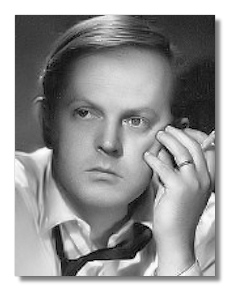
The Internet's Premier Classical Music Source
Related Links
-
Find CDs & Downloads
Amazon - UK - Germany - Canada - France - Japan
ArkivMusic - CD Universe
Find DVDs & Blu-ray
Amazon - UK - Germany - Canada - France - Japan
ArkivMusic-Video Universe
Find Scores & Sheet Music
Sheet Music Plus -
Recommended Links
Site News
Malcolm Williamson

(1931 - 2003)
Malcolm Benjamin Graham Christopher Williamson, composer of The Happy Prince, was born in 1931 in Sydney, Australia. He entered the Sydney Conservatory at the age of eleven to study french horn and piano, and composition with Sir Eugene Goossens. In 1950 he went to London for further musical studies, taking composition lessons with Elizabeth Lutyens and Erwin Stein, and has made his home in England since 1953. As a student in London he discovered the newer European music by composers such as Arnold Schoenberg, Igor Stravinsky, and Pierre Boulez, and was particularly strongly influenced by the music of Olivier Messiaen. He became so fascinated with the French composer that he took up the study of the organ (Messiaen's instrument), becoming a virtuoso performer who was employed for five years as a church organist. An outstanding pianist as well, he has given many performances and made recording of his own works; for a time in the early '60's his compositions always included keyboard parts. He performed as a night club pianist in the late '50's, and this influence can often be heard in his music. In 1970 Williamson was composer-in-residence for one academic year at Westminster Choir College in Princeton, NJ. In 1975 he succeeded Arthur Bliss as Master of the Queen's Musick, and was made a Commander of the Order of the British Empire (C.B.E.) in 1976. In 1977 he was elected president of the Royal Philharmonic Orchestra.
Malcolm Williamson's writing is often in highly conflicting styles, with his earlier efforts displaying considerable wit and invention, and his later methods showing a precise sense of effort and standard of invention. While some of his earliest pieces invoked thoughts of John Ireland others, like the prize-winning Concerto for Piano and Strings, are tersely Stravinskian.
Malcolm Williamson's earliest works were for his own keyboard performances or works written to appeal broadly to the public, such as some fairly unremarkable hymns and carols. He is a highly prolific composer, writing in all forms including symphonies, concerti (including his second piano concerto – the 1960 Concerto for Piano and Strings – perhaps his most popular work, which won a major Australian prize and provided the composer the opportunity to perform it all over the world), organ works, chamber compositions, masses, theatre music, and operas. His opera Our Man in Havana was premiered at Sadler's Wells and subsequently performed in Germany, Belgium, Hungary, and the US. The success of this opera led to several commissions.
Copyright © 1996 by Jane Erb
Recommended Recordings
Recommended Work
- Recommendation to come…
-













